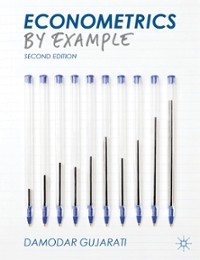Question
Which of the following regarding inflation is true? (a) If CPI changes from 100 to 105 in a year and then changes from 105 to
Which of the following regarding inflation is true?
(a) If CPI changes from 100 to 105 in a year and then changes from 105 to 100 in the following year, then the initial rate of price increase is greater than the following rate of price decrease. (b) If CPI doubles in one year and then remains at that high level for five years, it means that the country suffers high inflation for five years.
(c) If CPI is cut by half in one year, it means that the deflation rate of that year is 0.5%.
(d) Increasing CPI means that money is getting more and more valuable.
(e) None of the above.
2. If the realised inflation rate turns out much higher than people expected, who in the following will be a "winner" of a long-term contract?
(a) A landlord who entered a two-year letting contract with $700 monthly rent.
(b) An employer who entered a two-year wage contract with $4000 monthly salary.
(c) A lender who entered a two-year debt contract with $10,000 lendings.
(d) A mobile phone company who entered a two-year mobile phone contract with $40 monthly payment with its new customer.
3. What is the yield to maturity of a one-year discount bond with no coupons and face value $500 that it is sold for $400,
(a) 100%,
(b) 80%,
(c) 25%,
(d) 20%,
(e) 15%.
4. Suppose that the yield of bonds issued by firm XYZ decreased.
Which of the following scenarios is the LEAST likely one to have caused this decrease?
1 (a) The firm's credit rating went up.
(b) The firm's collateral value went up.
(c) Investors' demand for assets went up.
(d) A lot of other firms started to issue bonds.
5. How much will you have to repay if you borrow $1000 for 3 years at an interest rate of 10%? (a) $1210
(b) $1333
(c) $1313.13
(d) $1331
(e) $1220
6. Financial intermediaries
(a) provide a channel for linking those who want to save with those who want to invest.
(b) produce nothing of value and are therefore a drain on society's resources.
(c) hurt the performance of the economy.
(d) hold very little of the average American's wealth.
7. Stockholders are residual claimants, meaning that they
(a) have the first priority claim on all of a company's assets.
(b) are liable for all of a company's debts.
(c) will never share in a company's profits.
(d) receive the remaining cash flow after all other claims are paid.
8. Which one of the following is NOT a correct definition of Gross Domestic Product (GDP)? (a) GDP is the value of the final goods and services produced in the economy during a given period.
(b) GDP is the sum of value added in the economy during a given period.
(c) GDP is the sum of labor incomes in the economy during a given period.
(d) All of the above are correct definitions of GDP.
9. You read a story in the newspaper announcing the proposed merger of Dell Computer and Gateway. The merger is expected to greatly increase Gateway's profitability. If you decide to invest in Gateway stock, you can expect to earn
(a) above average returns since you will share in the higher profits.
(b) above average returns since your stock price will definitely appreciate as higher profits are earned.
(c) below average returns since computer makers have low profit rates.
(d) a normal return since stock prices adjust to reflect expected changes in profitability almost immediately.
10. According to rational expectations theory, forecast errors of expectations
(a) are more likely to be negative than positive.
(b) are more likely to be positive than negative.
(c) tend to be persistently high or low.
(d) are unpredictable.
11. Which of the following would count as valid evidence against the efficient markets hypothesis?
(a) Some investors make huge profits betting on specific stocks on the stock market.
(b) Financial crises still occur.
(c) Stock prices always rise two days after good news are released.
(d) Stock prices are very volatile.
(e) A company's stock price does not always rise with good news about that company.
12.
If bad credit risks are the ones who most actively seek loans, then financial intermediaries face
(a) a moral hazard problem.
(b) an adverse selection problem.
(c) a free-riding problem.
(d) no problem at all.
13. Consider a stock that pays a year-end dividend of $2.00 and has an expected sales price of $103. Suppose you require a rate of return of ke = 5%.
How would you calculate the current price of the stock (you'd be ready to pay)?
(a) Using the Gordon Growth model;
(b) Using the one-period valuation model;
(c) Using the Generalized Dividend Valuation Model;
(d)Using non of the above
Step by Step Solution
There are 3 Steps involved in it
Step: 1

Get Instant Access to Expert-Tailored Solutions
See step-by-step solutions with expert insights and AI powered tools for academic success
Step: 2

Step: 3

Ace Your Homework with AI
Get the answers you need in no time with our AI-driven, step-by-step assistance
Get Started


